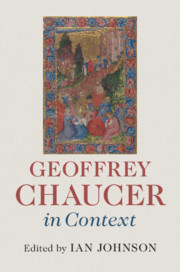Book contents
- Geoffrey Chaucer in Context
- Geoffrey Chaucer in Context
- Copyright page
- Contents
- Illustrations
- Contributors
- Abbreviations
- Introduction
- Part I Chaucer as Context
- Part II Books, Discourse and Traditions
- Part III Humans, the World and Beyond
- Chapter 19 Chaucer’s God
- Chapter 20 Holiness
- Chapter 21 Secularity
- Chapter 22 The Self
- Chapter 23 Women
- Chapter 24 Sex and Lust
- Chapter 25 Animals in Chaucer
- Part IV Culture, Learning and Disciplines
- Part V Political and Social Contexts
- Part VI Chaucer Traditions
- Further Reading
- Index
Chapter 20 - Holiness
from Part III - Humans, the World and Beyond
Published online by Cambridge University Press: 24 June 2019
- Geoffrey Chaucer in Context
- Geoffrey Chaucer in Context
- Copyright page
- Contents
- Illustrations
- Contributors
- Abbreviations
- Introduction
- Part I Chaucer as Context
- Part II Books, Discourse and Traditions
- Part III Humans, the World and Beyond
- Chapter 19 Chaucer’s God
- Chapter 20 Holiness
- Chapter 21 Secularity
- Chapter 22 The Self
- Chapter 23 Women
- Chapter 24 Sex and Lust
- Chapter 25 Animals in Chaucer
- Part IV Culture, Learning and Disciplines
- Part V Political and Social Contexts
- Part VI Chaucer Traditions
- Further Reading
- Index
Summary
Although much about holiness in Chaucer’s works remains disputed, elliptical, or even contradictory, many of his images of religious devotion and popular piety are themselves situated in a broader cultural context than is usually recognised. For Chaucer, as for most late medieval Christians of his day, holiness was instantiated in matter, present and manifest in shrines, relics, holy objects and in the natural world, and he shows himself attentive to such materiality in his images of popular religion. Many of the Tales celebrate orthodox Christian materiality in ways that align his devotional interests with those found in a broad range of English religious writings by authors with whom he is not typically connected, including Julian of Norwich and the Carthusian Nicholas Love. Other Tales offer an incisive critique of holiness in the context of contemporary practices within the Church. Chaucer’s many-sided works hold these glimmering tensions in balance.
Keywords
- Type
- Chapter
- Information
- Geoffrey Chaucer in Context , pp. 167 - 177Publisher: Cambridge University PressPrint publication year: 2019

